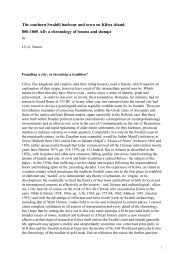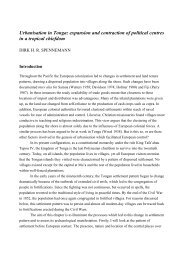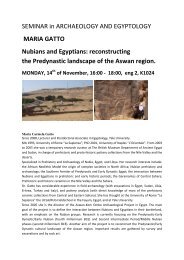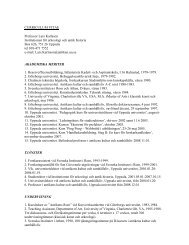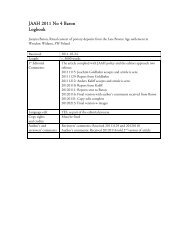Beowulf - Institutionen för arkeologi och antik historia
Beowulf - Institutionen för arkeologi och antik historia
Beowulf - Institutionen för arkeologi och antik historia
You also want an ePaper? Increase the reach of your titles
YUMPU automatically turns print PDFs into web optimized ePapers that Google loves.
2209 hé gehéold tela<br />
fiftig wintra— wæs ðá fród cyning,<br />
eald éþelweard—, oð ðæt án ongan<br />
deorcum nihtum draca rícsian,<br />
2209 he reigned well<br />
for fifty winters— was that time a wise old king<br />
the country’s old guardian—, until one began<br />
in the dark night a dragon to rule,<br />
So, no sooner have we learned that <strong>Beowulf</strong> has grown old than we are told about the<br />
ominous dragon which is eventually to kill him, thereby ruining the nation. What follows<br />
is in essence an account of a series of tragic events and the shortcomings of lesser men<br />
reflected in and contrasted to the heroic deeds of the young and middle-aged <strong>Beowulf</strong>.<br />
<strong>Beowulf</strong> (Part II) is not a poem about the good. It is a poem about the inevitable or<br />
the hopeless and the agony of a nation that has lost its king. It does not help that these<br />
<strong>Beowulf</strong>’s last days contain some references to Christ’s Maundy Thursday. <strong>Beowulf</strong>,<br />
as it happens, sets out with twelve men, of whom one is the thief (a parallel to Judas)<br />
who stole from the dragon and enraged it (vv. 2400 ff.). This man leads the party to the<br />
dragon’s cave and here <strong>Beowulf</strong>, in a mood similar to that of Jesus in the Garden of<br />
Gethsemane (Klaeber note to v. 2418), takes leave of the twelve men. He does so in<br />
a manner just as dignified as that of Jesus, but more long-winded. In this situation there<br />
is perhaps also a possible Peter parallel in the strange character of the young Wiglaf.<br />
He is one of the twelve followers who, when they have fled into the woods, speaks as<br />
their leader and steps forward to declare two things: first that <strong>Beowulf</strong> must not forget<br />
what he swore in his youth and, secondly that he, Wiglaf, like Peter at the Mount of<br />
Olives, will not abandon, but help him (vv. 2663 ff.). Then <strong>Beowulf</strong> steps forward to<br />
kill the dragon and be killed and as a result of his death the Geatish nation will soon<br />
come to an end.<br />
Even though <strong>Beowulf</strong> (Part II) refers to the dying Jesus, it fails to inspire the hope<br />
expressed in ‘Behold the Lamb of God, who takes away the sin of the world’ (John<br />
1,29). On the contrary, we follow a Jesus who leaves us on our pilgrimage in a desolate<br />
and difficult place like the vale of Baca (Psalm 84, line 6), which Luther preferred to<br />
call the vale of tears. To the Geats this is the beginning of the end, but to Wiglaf it may<br />
be the beginning of a new era.<br />
Wiglaf’s opinions as he expresses them in his little speech are most uncalled for<br />
and he is an odd hero inasmuch as he is what no other heroes are, namely helpful,<br />
nice and unobtrusive and something of a knowall. While <strong>Beowulf</strong> clashes with the<br />
dragon for the second time Wiglaf manages, as if by chance, to wound it, so that its<br />
fire dies down a little, thus giving the death-marked <strong>Beowulf</strong> a chance to finish it off.<br />
He does so, and there are rumours that one of Wiglaf’s hands was burned off by the<br />
dragon. This, however, does not prevent him, single handed, from offering <strong>Beowulf</strong><br />
78



